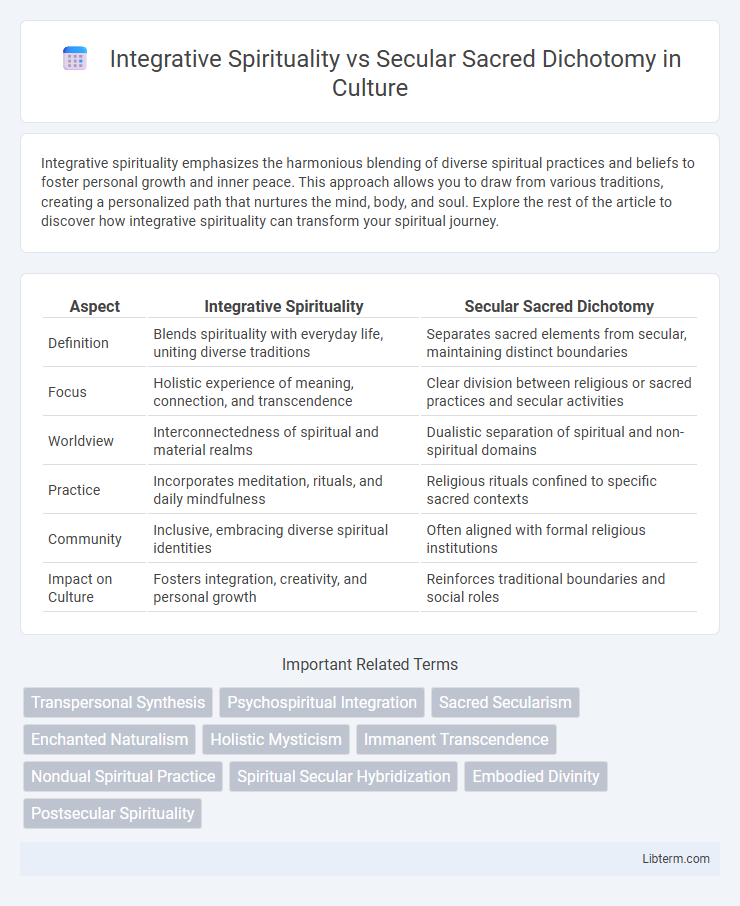Integrative spirituality emphasizes the harmonious blending of diverse spiritual practices and beliefs to foster personal growth and inner peace. This approach allows you to draw from various traditions, creating a personalized path that nurtures the mind, body, and soul. Explore the rest of the article to discover how integrative spirituality can transform your spiritual journey.
Table of Comparison
| Aspect | Integrative Spirituality | Secular Sacred Dichotomy |
|---|---|---|
| Definition | Blends spirituality with everyday life, uniting diverse traditions | Separates sacred elements from secular, maintaining distinct boundaries |
| Focus | Holistic experience of meaning, connection, and transcendence | Clear division between religious or sacred practices and secular activities |
| Worldview | Interconnectedness of spiritual and material realms | Dualistic separation of spiritual and non-spiritual domains |
| Practice | Incorporates meditation, rituals, and daily mindfulness | Religious rituals confined to specific sacred contexts |
| Community | Inclusive, embracing diverse spiritual identities | Often aligned with formal religious institutions |
| Impact on Culture | Fosters integration, creativity, and personal growth | Reinforces traditional boundaries and social roles |
Understanding Integrative Spirituality
Integrative Spirituality combines elements from diverse religious, spiritual, and secular traditions to create a cohesive, personalized approach to meaning and purpose, transcending the Secular Sacred Dichotomy that separates spiritual experiences from secular life. It emphasizes interconnectedness, mindfulness, and holistic well-being, fostering a deeper sense of unity across seemingly disparate beliefs and practices. This approach supports inner transformation and social engagement without strict adherence to dogma, reflecting contemporary spiritual pluralism and evolving metaphysical perspectives.
Defining the Secular-Sacred Dichotomy
The secular-sacred dichotomy delineates two distinct realms where secular pertains to non-religious, worldly aspects of life, while the sacred involves elements considered holy, spiritual, or connected to divine significance. This dichotomy often influences cultural, social, and philosophical frameworks by separating spiritual beliefs from everyday secular experiences. Understanding this division is crucial for exploring how integrative spirituality seeks to bridge or transcend these boundaries by blending sacred values within secular contexts.
Historical Roots of Spiritual Division
The historical roots of the spiritual division between integrative spirituality and the secular sacred dichotomy trace back to Enlightenment thought, which emphasized rationality and separated religious experience from secular life. This divide deepened during the 19th and 20th centuries with the rise of secular humanism and the institutionalization of religion as distinct societal spheres. Integrative spirituality challenges this division by blending mystical, religious, and secular practices into a holistic experience of the sacred.
The Rise of Holistic Worldviews
The rise of holistic worldviews integrates spiritual, ecological, and scientific perspectives, challenging the traditional Secular Sacred dichotomy that separates spirituality from empirical knowledge. Integrative spirituality emphasizes interconnectedness and personal experience as sources of meaning, transcending rigid categorizations between sacred and secular domains. This shift promotes a comprehensive understanding of existence that aligns with global sustainability and well-being paradigms.
Bridging Science and Spiritual Ethics
Integrative spirituality bridges science and spiritual ethics by harmonizing empirical inquiry with values rooted in human consciousness and morality. This approach challenges the secular sacred dichotomy, which separates scientific rationality from spiritual meaning, advocating for a unified framework that respects both objective evidence and subjective experience. Research in neurotheology and consciousness studies exemplifies this integration, fostering ethical systems informed by scientific understanding and spiritual wisdom.
Personal Meaning in a Fragmented World
Integrative spirituality offers a cohesive framework that blends diverse religious, secular, and mystical elements, fostering a holistic sense of personal meaning amid cultural fragmentation. The secular sacred dichotomy often creates a polarized approach, limiting individuals to rigid categories that can hinder authentic spiritual engagement and inner coherence. Embracing integrative spirituality enhances resilience and self-understanding by promoting interconnectedness and subjective sacredness beyond traditional dichotomies.
Community Practices: Unity Versus Segregation
Integrative spirituality fosters inclusive community practices that emphasize unity by blending diverse religious and secular elements into shared rituals and celebrations. In contrast, the secular sacred dichotomy often maintains segregation by distinguishing between spiritual and non-spiritual activities, leading to distinct community groups based on belief systems. This divergence impacts social cohesion, with integrative approaches promoting interconnectedness while secular sacred divides may reinforce separation and identity boundaries.
Integrative Spirituality in Modern Life
Integrative Spirituality in modern life emphasizes the blending of diverse spiritual practices with everyday experiences, promoting holistic well-being and inner harmony. It transcends traditional boundaries by incorporating mindfulness, meditation, and ethical living into secular settings, fostering a personal connection to meaning and purpose. This approach supports adaptive resilience and mental health, bridging the gap between spirituality and contemporary secular lifestyles.
Challenges to Overcoming the Dichotomy
Overcoming the integrative spirituality versus secular sacred dichotomy faces challenges rooted in deeply ingrained cultural and epistemological divides between spiritual experiences and secular rationality. The tension arises from differing worldviews that separate transcendental meaning from empirical evidence, creating barriers to unified frameworks that harmonize spiritual and secular insights. Addressing these challenges requires innovative dialogue fostering mutual respect and integrating diverse practices without diluting their core significance.
Toward a Unified Approach: Future Perspectives
Integrative spirituality combines elements from diverse traditions, transcending the limitations of the secular sacred dichotomy by fostering holistic growth and interconnectedness. Emerging research emphasizes neurobiological coherence and cross-cultural practices that support a unified framework for spiritual experience beyond institutional boundaries. Future perspectives highlight the potential for integrative approaches to enhance well-being, ethical living, and global harmony through inclusive, evidence-based methodologies.
Integrative Spirituality Infographic

 libterm.com
libterm.com